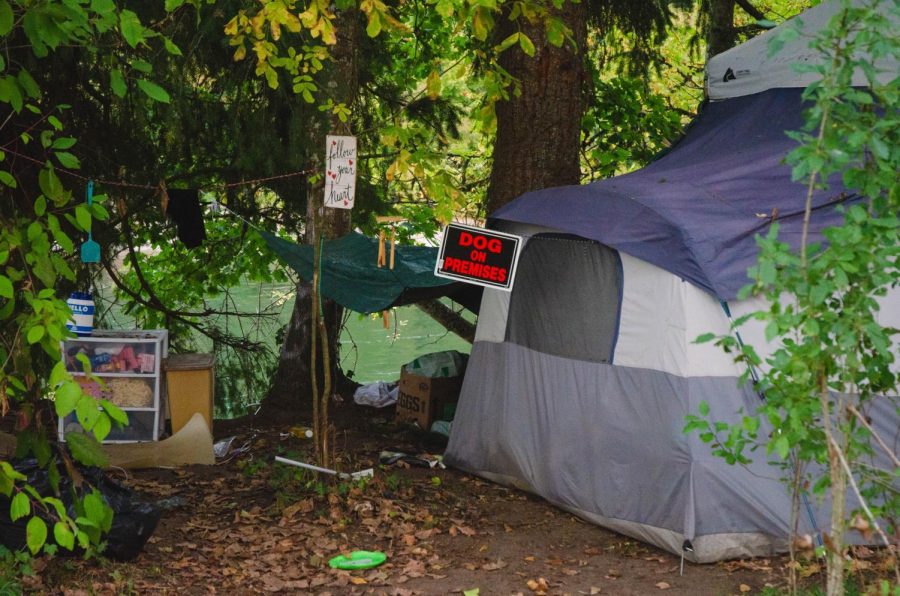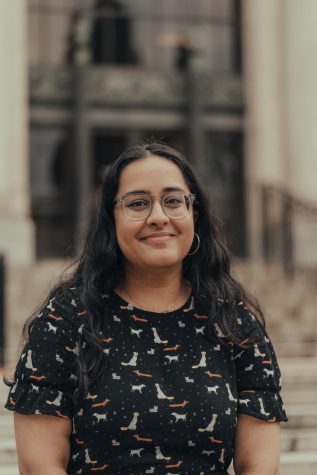Corvallis providing more resources to homeless community due to COVID-19
October 22, 2020
With winter weather quickly approaching, Corvallis shelters and community centers are adapting to COVID-19 health policies to house as many people as possible, though capacities and resources are both limited.
Sara Power is the shelter director at Room at the Inn, a homeless women’s shelter in Corvallis. Before COVID-19 hit, the shelter operated only as an overnight cold weather shelter.
“We were able to switch to a 24/7 facility because we had room to spread beds out to appropriate distances,” Power said via email. “We had to add three staff members in the shelter and three kitchen staff to be able to offer the services we now have.”
Currently, Room at the Inn offers bed, shower and laundry services, as well as three meals a day and other activities.
“Since July, the city of Corvallis has been supporting the shelter operations, through [Coronavirus Aid, Relief and Economic Security] funding and other funds that they administer,” Power said. “From late March until mid-July, we were scrambling to put together sufficient funds to keep open.”
Power said the Room at the Inn is usually full, even with their increase of 18 beds to 22. The shelter has served more than 70 women since mid-March when they switched to 24/7 services.
Regan Benitez works as a social services assistant with Community Outreach, Inc., a community center that provides housing in Corvallis and Albany.
In regards to how COVID-19 affected their services, Benitez said the biggest struggle for COI was providing housing for everyone who needed it.
“The most [common] thing is we’ve just been getting huge floods of people looking for housing and it’s sad because, although we can help a good amount, aside from us, there are no other local shelters like this—besides two lower-bearing shelters in Albany that aren’t as equipped for helping people integrate back into society,” Benitez explained.
Benitez said COI provides housing in a men’s dorm, a women’s dorm and a family dorm.
“We can house up to 12 women at a time, 16 men at a time, and 11 families at a time,” Benitez said. “Our other main community service that we provide right now is food boxes, and we do those daily. But aside from that, we also do some behavioral health and we also have a medical clinic.”
The biggest challenge, Power said, has been getting volunteers to help their overnight staff and to help out in the kitchen while following best practices to avoid COVID-19. For the most part, guests behave as a pod or family group and protect themselves appropriately when they are out of the shelter on essential trips.
“We’d love to have students volunteer in the kitchen, or as back up overnight volunteers,” Power said. “They need to be symptom-free, and with no known contact with people who have tested positive.”
According to Benitez, COI has also been receiving requests from people needing more food resources or help with school at home—but the housing problem has been the biggest crisis.
“We definitely got help from the [Community Services Consortium] just in the past two weeks we’ve been under lockdown here,” Benitez said. “The local CSC has been really awesome with aiding us with meals from local restaurants, different snacks and drinks for our residents, so that’s been our greatest help, definitely.”
Benitez noted COI has slowed a bit because it was hard to get their residents back to their own place, to work on their own goals, when everything was shut down. When talking about their residents and how they have coped with COVID-19, Benitez said the most difficult part is dealing with mental health.
“A lot of our residents have been struggling with this recently since it’s hard—you’re told to quarantine, to try to stay mostly in your place of home—it’s hard when you’re in a shelter,” Benitez said. “It’s not the same as being on your couch at home watching TV. We don’t have many activities, or different things to do in here as you would like.”
For residents, Benitez said, dealing with testing, not seeing family and friends, and taking care of children are major concerns. She wants people to remember to value the people in their lives and to always lend a helping hand.
“It means more than you think,” Benitez said.
Nicole Hindes, director of the Human Services Resource Center, said via email the HSRC can help students in multiple ways if they’re facing housing insecurity.
The HSRC has short-term emergency housing in a partnership with University Housing and Dining Services, where they can house students in a residence hall for up to 28 days while students figure out their next steps.
“We also have our awesome Basic Needs Navigator—Miguel Arellano,” Hindes said. “Miguel meets with students one on one if they’re having a hard time find[ing] sustainable affordable housing – or if they’re imminently at risk for homelessness.”
In addition to helping students access HSRC Emergency Housing, Hindes said that Arellano can help students find somewhere more permanent to live and apply for emergency grants and other sources of support that might help their budget.
“We’ve shifted some of our resources to be delivered digitally—for example, textbooks are being offered as digital course reserves in partnership with the Valley Library,” Hindes said via email. “We’re supporting students over Zoom with applying for the Supplemental Nutrition Assistance Program, commonly known as food stamps, or the Oregon Health Plan. In-person services like laundry and grocery support are still available.”




















































































![Newspaper clipping from February 25, 1970 in the Daily Barometer showing an article written by Bob Allen, past Barometer Editor. This article was written to spotlight both the student body’s lack of participation with student government at the time in conjunction with their class representatives response. [It’s important to note ASOSU was not structured identically to today’s standards, likely having a president on behalf of each class work together as one entity as opposed to one president representing all classes.]](https://dailybaro.orangemedianetwork.com/wp-content/uploads/2025/03/Screenshot-2025-03-12-1.00.42-PM-e1741811160853.png)
























